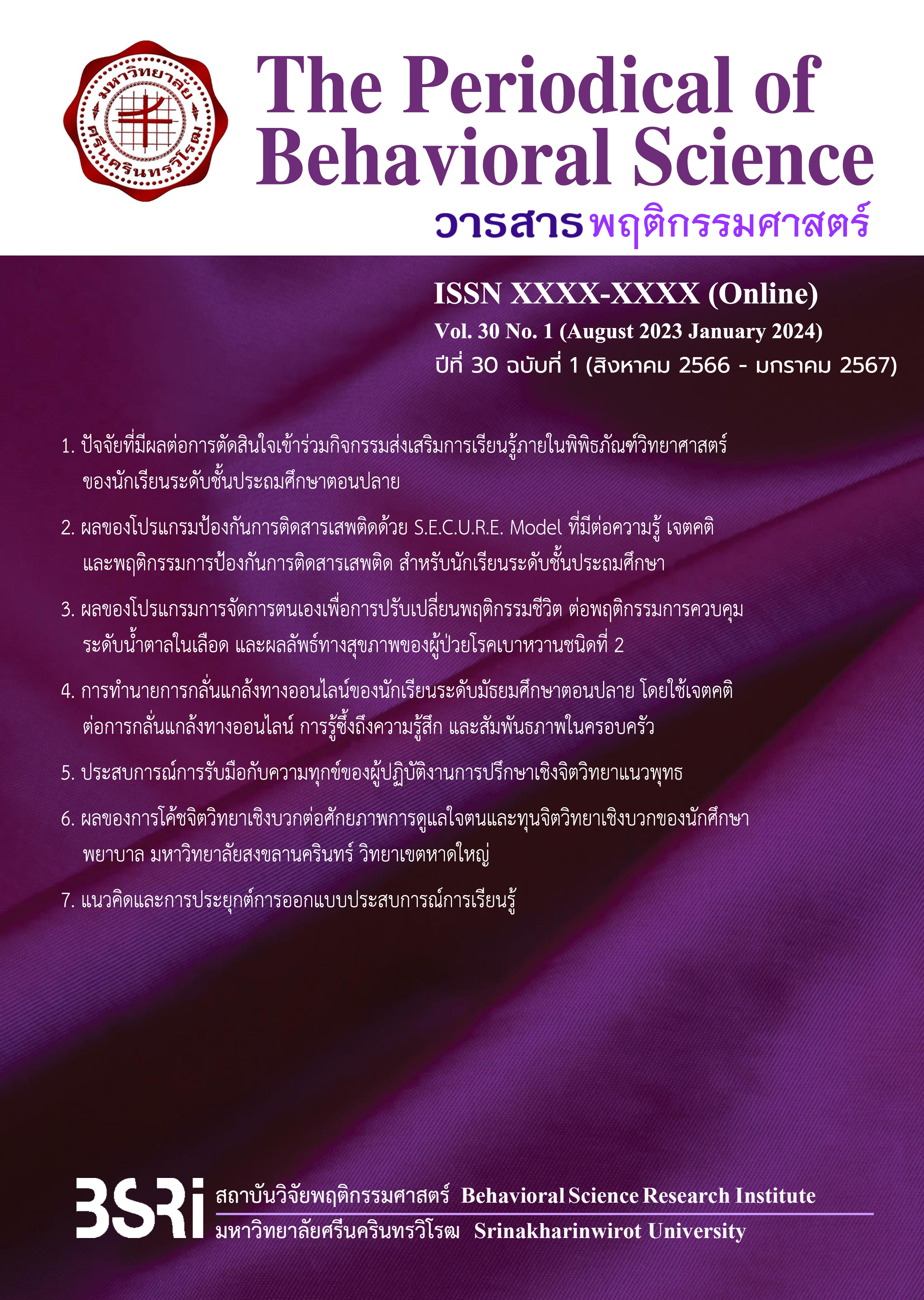The Factors Affecting the Decision to Participate in Education Programs in Science Museum of Upper Elementary Students
Keywords:
Education Programs, Science Museum, Informal Learning, Upper Elementary StudentAbstract
The education programs in museums aim to offer enjoyable and positive experiences for children in all ages based on the needs of the visitors. Thus, the objective of this study was to analyze the factors affecting the decision of upper elementary students to participate in education programs in science museum. The samples consisted of 200 upper elementary students who visited the National Science Museum (NSM), Thailand in December 2020. The research instrument was a questionnaire including three parts: personal information, factors affecting decision making, and activity participation. Cronbach’s alpha coefficient for reliability of each questionnaire was between 0.72 - 0.93. Data was analyzed and presented using descriptive statistics and stepwise multiple regression analysis. The result showed that the important factors and predictions for the decision to participate in the education programs in the science museum of students at 54.7%, by family economic status, science career interest, attitude towards science and science academic support of family with statistically significant at the .001 level. In addition, students were most interested in survey activities. The results from this study can shed light on the guidelines of development of education programs within informal learning centers.
Downloads
References
Amonsak, W. (2013). Antecidents and Consequences of Learning Behavior in Science Subject of Junior Secondary Students [Unpublished Master’s thesis]. Srinakharinwirot University.
Caspi, A., Gorsky, P., Nitzani-Hendel, R., Zacharia, Z. C., Rosenfeld, S., Berman, S., & Shildhouse, B. (2020). Children's perceptions of the factors that led to their enrolment in advanced, middle-school science programmes. International Journal of Science Education. 42(11), 1915-1939.
Dornchai, P. (2018). Variables Influencing Activity Participation Behavior among undergraduate students at Rajabhat Mahasarakham University. Kasem Bundit Journal, 19(1), 89-102.
Falk, J. H., & Dierking, L. D. (2000). Learning from museums: visitor experiences and the making of meaning (Vol. American Association for State and Local History book series). AltaMira Press.
Hair, J. F., Anderson, R. E., Babin, B. J., & Black, W. C. (2010). Multivariate Data Analysis: A Global Perspective (7th ed.). Pearson Education.
Jamonniam, S. (2005). The Effect of Using an Interdisciplinary Mathematic Activity Package Concerning Surface Areas and Volumes on Interrest in Mathematics of Mathayomsuksa III Students [Unpublished Master’s thesis]. Srinakharinwirot University.
Klamngam, S. (2009). Factors Affecting Decision to Study of Mathayom Suksa 4 Students in Loei Educational Service Area Office One [Unpublished Master’s thesis]. Loei Rajabhat University.
Krainatee, M., Dhammasaccakarn, W., & Sungkharat, U. (2020). Family: The Social Key Institutions and Roles of Holistic Human Development]. Parichart Journal Thaksin University. 33(1), 1-16
Maslow, A. (1970). Motivation and Personality. Harper and Row Publishers.
Moolsadang, S. (2006). Developing Study Habits for Academic Achievement. Human Resources Development Journal, 2(2), 443-545.
Nakjui, S. (2015). Factors Affecting the Ability to Scientific Knowledge Seeking of Mathayom Suksa I Students in Kanchanaburi Educational Service Area Office [Unpublished Master’s thesis]. Kanchanabur Rajabhat University.
National Science Museum. (2020). National Science Museum Thailand (NSM)’s Background. http://www.nsm.or.th/nsm/about-us/corporate-information.html
Nonwong, J., Erawan, W., & Wanchanthuek, P. (2015). Factors Affecting The Decision Making In Choosing Educational Plan Of Mattayom Suksa III Students: A Discriminant Analysis And Support Vector Machine Analysis. Journal of Education, Mahasarakham University, 9(Special Edition), 77-92.
OECD. (2016). PISA 2015 Results (Vol. I): Excellence and Equity in Education. OECD Publishing.
Office of the Higher Education Commission. (2018). Higher education statistics. http://www.info.mua.go.th/info/
Office of the National Economic and Social Development Council. (2014). Overview of Research and Development in Thailand. Journal of Economic and Social. 51(1), 27-32
Office of the National Economic and Social Development Council. (2018). National Strategy 2018-2037. http://nscr.nesdb.go.th/ns/
Petchploy, A. (2000). A Study on Academic Achievement and Interest in Mathematics of Mathayom Suksa III Students through The Instruction based on Minicourses and The Teacher’s Manual [Unpublished Master’s thesis]. Srinakharinwirot University.
Petchseek, S. (2010). Family Factors Affecting Learning Achievement of Lower Secondary School Students: A Case Study of Minprasatwitaya School, Minburi, Bangkok [Unpublished master’s thesis]. National Institute of Development Administation
Reeder, W. (1971). Partial Theroies from thed 25 Years Reasearch Programe on Directive Factors in Believer and Social Action. Mc Grow Hill.
Reid, N. (2006). Thoughts on attitude measurement. Research in Science & Technological Education, 24(1), 3–27.
Sanittham, K. (2003). A Study of some Factors Related to The Motivation in Science Lerning of Mathayom Suksa III Students of Schools under Department of General Education in Nan Province [Unpublished master’s thesis]. Srinakharinwirot University.
Sanium, S., & Buaraphan, K. (2019). Metacognition to promote lifelong science learning]. Innovative Newsletter Institute for Innovative Learning, 14(55), 7-10
Simpson, R. D., & Oliver, J. S. (1990). A summary of major influences on attitude toward and achievement in science among adolescent students. Science Education, 74(1), 1–18.
Sungprasit, M. (2017). Family influence that directly affects the child. http://www.rama.mahidol.ac.th/ramachannel/article
Supasamit, S. (2009). Factors Affecting Motivattion to Participate in Student Activities of The Fourth Level, Secondary Grades 4-6 Students at Patumwan Demonstration School of Srinakharinwirot University Patumwan District, Bangkok [Unpublished master’s thesis]. Srinakharinwirot University.
Tiangpoonwong, S. (2008). Factoes Affecting Teaching Career Decision-Making: A Cross-Sample Analysis of Twelfth Grade Students and Pre-Service Teachers [Unpublished master’s thesis]. Chulalongkorn University.
Triyarat, W. (2017). Factors affecting engagement with informal science learning in Thailand: A regional perspective [Master’s thesis]. University of the West of England.
Tumbumrung, S. (2013). A Study on Habit, Habit Development and Attitudes of Mathayom Suksa 1 Students]. Journal of Educational Research Faculty of Education, Srinakharinwirot University, 7(2), 233-243.
Downloads
Published
How to Cite
Issue
Section
License
Copyright (c) 2024 Warasan Phuettikammasat

This work is licensed under a Creative Commons Attribution-NonCommercial-NoDerivatives 4.0 International License.
Behavioral Science Research Institute, SWU
114 Sukhumvit 23, Bangkok 10110, Thailand.
Tel.02-649-5000 # 17600



